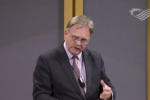
North Wales Assembly Member and Chair of the Assembly Cross Party Group on Fuel Poverty and Energy Efficiency, Mark Isherwood, has called for the Welsh Government’s new Fuel Poverty Strategy to address the concerns raised regarding its existing strategy and to heed the calls “for a more holistic approach” going forward.
A report on 3 October from the Auditor General for Wales said that although the number of households in fuel poverty in Wales had fallen since 2008, the Welsh Government had missed its targets.
Meanwhile, a report on 7 October from the Bevan Foundation revealed that In 2008, of the 70 per cent richest households, over 83,000 were estimated to be living in fuel poverty, and that that's now 75 per cent lower, whereas the bottom tenth poorest households have only seen a drop of 25 per cent.
In the Welsh Parliament yesterday, Mr Isherwood, said in order to meet targets in the future, the Welsh Government needs to adopt a different approach in its new Fuel Poverty Strategy.
Raising the issue with the Minister for Environment, Energy and Rural Affairs, he said:
“As you know, we were looking forward to the Fuel Poverty Strategy consultation hopefully being published this month, and the final plan next month. Last week, the Residential Landlords Association gave evidence to the Assembly's Climate Change, Environment and Rural Affairs Committee inquiry into fuel poverty, and called, quote, 'for a more holistic approach', saying that properties tackled by the current strategy have so far only been in some of the most deprived areas, and there will be many fuel-poor occupiers in homes in more affluent areas as well. And, amongst other calls, they called for the least fuel efficient homes to be targeted first, such as those properties with a low energy efficiency rating, including those in the private rented sector, and support for tenants.
“Last October, the Bevan Foundation report in this area found that the richest households benefited most from current fuel poverty or previous fuel poverty strategies, where the number of wealthier households in fuel poverty had fallen by 75 per cent, but, in the poorest households, only 25 per cent, and they said that provided an indication as to why the Welsh Government had failed in its target to eradicate fuel poverty.
Notwithstanding the overall reduction in the number of properties in fuel poverty, this identifies perhaps a need for a particular new focus. How will your new strategy address these concerns, and when do you expect the plan now to be published?”
In her response the Minister stated: “Obviously, as part of the new strategy, we can look at having that new focus, and I'd be very happy to get any evidence that's been given”.
